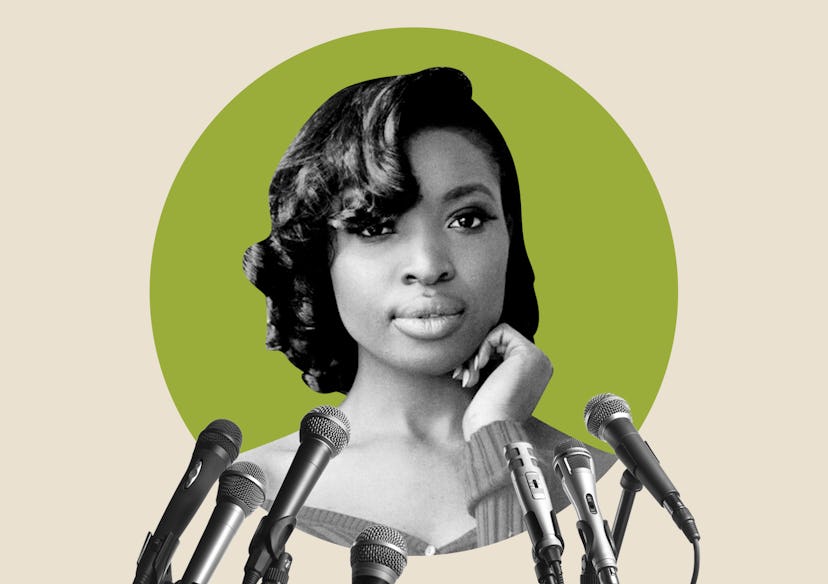The New Pioneers
How One PhD Student Tackles STEM’s Lack Of Representation Head On
“It’s inspiring to see Black women leading.”

In Bustle's Quick Question, we ask women leaders all about advice — from the best guidance they've ever gotten to what they're still figuring out. Here, Emory University chemistry Ph.D. candidate Ayanna J. Jones tells Bustle about why representation in STEM matters, her dream job, and what she’s had to unlearn through her academic career.
Science, technology, engineering, and mathematics (STEM) fields aren’t exactly known for their stellar track record on representation. According to data from the National Center for Science and Engineering Statistics, out of over 700,000 degrees or certificates earned from 2017 to 2018, only 8.4% went to Black students. Stats like these — not to mention feelings of isolation that Black STEM students and faculty face — led Ayanna J. Jones, 26, to co-found both STEM in Color, which connects minority students in STEM to scholarships and fellowships, in 2019, and Black in Chem, an organization to create a network for Black chemistry students and faculty, this year.
“Our goal is to show [white scientists] in the chemistry community that, you know, we're here,” says Jones. “There’s no excuse for people to say that the reason why we don't have Black faculty or Black graduate students in our department or within our labs is because we can't find them. What Black in Chem shows us is that there is a very large community of very capable and contributing scientists that happen to be Black.”
Below, Jones tells Bustle about her dream job, what inspires her, and how she’s amplifying the voices and experiences of Black women in STEM.
What’s on your to-do list right now?
AJJ: One million and one things. Today, I need to analyze my NMR spectrum data that I got back a couple of days ago and submit some more samples to the NMR for research I’m doing at the lab at Emory on plant roots and soil chemistry. The NMR is a nuclear magnetic resonance spectrometer, and it's how we characterize structures of molecules. Next on my to-do list is to send out emails to my students that I teach. I finished a few of my Netflix series — The Queen's Gambit was super empowering — and have a couple of Netflix series that I really want to finish. And lastly, to sleep.
What’s your dream job?
AJJ: Right now, I am assisting NASA scientists in developing a next-generation earth system model that utilizes massive amounts of satellite and ground data to improve climate prediction from the seasonal to century time scales, meaning short to extended periods of time. In particular, I am helping to develop the rhizosphere portion of the carbon cycle. The rhizosphere describes how nutrients and microbes affect plant life cycles. My dream job is to continue at NASA and work there for a little bit. I would love to do some science policy as well, working either within the White House or a separate institute to increase minority participation in STEM.
“It’s OK to ask for help and it's OK to not know something.”
Who inspires you the most?
AJJ: I'm so inspired by Black women pushing the envelope. There are so many tropes that we have to fight in the workplace. It’s inspiring to see Black women leading in various spaces, whether it's STEM, technology, or business.
What is one thing you’ve had to learn or unlearn while pursuing your Ph.D. in Chemistry?
AJJ: I had to learn that it's OK to not be OK. A lot of times, as Black women, we think that we have to be perfect and the weight of the world is on our shoulders because we are the first Black women in our spaces. It’s OK to ask for help and it's OK to not know something.
I’ve also learned the value of a great support system, particularly for students from underrepresented groups. Most spaces that we are in have very few people that look like us, so it's important to find a support network that’s representative of your values and goals.
If there is anything you would have told your younger self, what would it be?
AJJ: I would tell my younger self to go after every single opportunity available. Do not shy away. Apply for everything. I think a lot of times we think, “Well, everyone's applying...” but no! You can't get something if you don’t put yourself out there. The answer is no until you ask. I would also tell my younger self there are usually multiple ends to a mean, and that my path does not have to look like anyone else's. This was the hardest thing I had to learn. And just keep going. It will get better.
This interview has been edited for length and clarity.